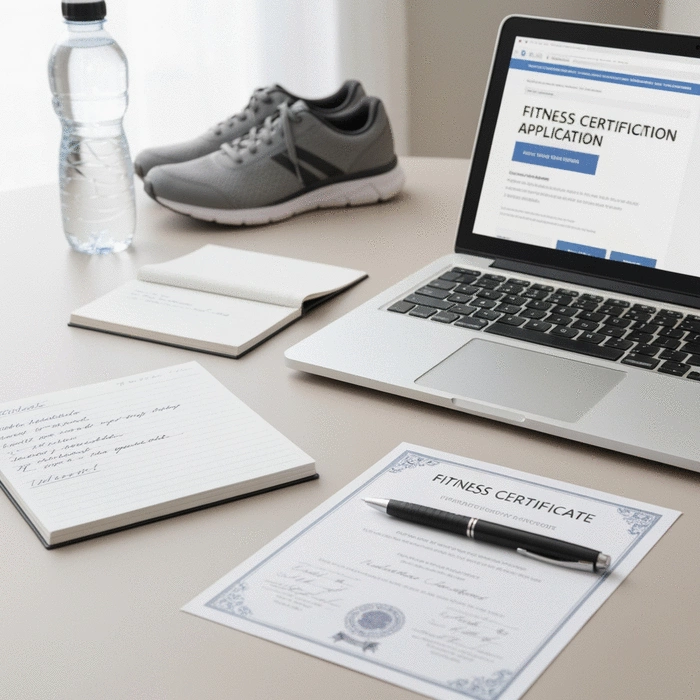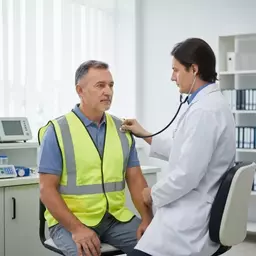How to Obtain a Fitness Certificate For Work

Posted on: 2025-12-31
By: Thandiwe Mokoena
Did you know that a fitness certificate can greatly enhance workplace safety and compliance? This essential document confirms an employee's physical and mental readiness, ensuring a safer environment for everyone involved. Let's explore the key insights on fitness certificates.
What You Will Learn
- A fitness certificate verifies an individual's health status, making it crucial for job suitability.
- It's often mandatory in high-risk industries such as construction, healthcare, and logistics.
- Regular health assessments can lead to early detection of potential health issues, promoting proactive care.
- Employees have the right to clear information about fitness assessments and access to their medical records.
- Investing in employee health through regular assessments boosts productivity and morale while reducing absenteeism.
Fitness Certificate Process Flow
The essential steps to obtain a fitness certificate, ensuring a safe and compliant workplace.
Find Registered Healthcare Provider</small >
Prepare for Medical Examination</small >
Receive Certificate & Understand Next Steps</small >
Understanding the Importance of a Fitness Certificate for Employment
As we dive into the world of occupational health and safety, one term that frequently comes up is the fitness certificate. But what exactly is it, and why is it so crucial for employment? A fitness certificate is a formal document that verifies a candidate's physical and mental health status, indicating their suitability for a specific job. It's not just a piece of paper; it’s a reflection of your well-being and a protective measure for both employees and employers! Additionally, understanding the intricacies of the Occupational Health and Safety Act 85 of 1993 is essential for comprehensive workplace safety.
In South Africa, having a fitness certificate is often a requirement for various industries, especially those that involve manual labor, operating machinery, or offering health-related services. This certificate ensures that the employees are fit to perform their roles safely, reducing the risk of workplace injuries and potential liability for employers. When you think about it, it’s a win-win situation!
What Is a Fitness Certificate and Why Is It Necessary?
A fitness certificate serves as proof that an individual has undergone a comprehensive health assessment, confirming that they meet the necessary standards for their job. This document can include evaluations of physical fitness, mental well-being, and any specific health requirements based on the role. Essentially, it sets the stage for a safer workplace environment and promotes a culture of health and compliance.
- Confirms physical and mental readiness for specific job tasks
- Protects employers from potential health-related liabilities
- Enhances workplace safety and employee morale
At OHS Hub South Africa, we understand how vital this documentation is. As someone who has worked for over a decade in occupational health, I’ve seen firsthand how a fitness certificate can positively impact an organization and its workforce.
Situations That Require a Fitness Certificate
Fitness certificates are not just for any job! They are essential in specific situations, particularly in high-risk industries. Here are some common scenarios where a fitness certificate is mandatory:
- Forklift operators and drivers of heavy machinery
- Employees in the construction industry
- Professionals working in healthcare settings
- Workers exposed to hazardous materials or environments
If you're unsure whether your position requires a fitness certificate, it’s always best to consult with human resources or safety officers in your organization. They can guide you through the specific requirements relevant to your job. For more guidance, explore our resources on what is a risk assessment to better understand workplace safety protocols.
How a Fitness Certificate Relates to Occupational Health
The connection between a fitness certificate and occupational health is undeniable. A fitness certificate not only verifies that an employee can physically perform their job but also plays a significant role in occupational health management. Regular assessments help identify potential health issues early, ensuring interventions can be made before they escalate into serious problems.
- Supports employee health monitoring and preventive care
- Promotes adherence to safety regulations and standards
- Facilitates a proactive approach to employee wellness
In my experience, fostering a culture of health within the workplace begins with understanding these connections. By prioritizing fitness assessments, we can work towards safer and healthier environments for everyone.
Pro Tip
Did you know? Regular health assessments not only ensure compliance with occupational health standards but also significantly boost employee morale and productivity? Encourage a culture of wellness in your workplace by integrating fitness assessments into your routine. This proactive approach can lead to a healthier, happier workforce and ultimately contribute to the success of your organization!
Summarizing the Key Takeaways on Fitness Certificates
As we wrap up our discussion on fitness certificates, it’s crucial to understand their role in promoting a safe and compliant workplace. A fitness certificate is not just a piece of paper; it’s a vital document that proves an employee's capability to perform their job safely. Here’s a quick recap of the essential steps to obtain your fitness certificate:
- Identify the type of fitness certificate required for your specific employment situation.
- Find a registered healthcare provider for your medical evaluation.
- Prepare adequately for your medical examination.
- Receive your certificate and understand the next steps for employment.
By following these steps, you can ensure that you’re well-prepared and informed about the fitness assessment process. Remember, staying informed about your rights as an employee is just as important as obtaining the certificate itself!
The Importance of Staying Informed About Employee Rights
It’s essential to know your rights when it comes to fitness certificates and health assessments. Employees have the right to:
- Receive clear information about the purpose of the fitness assessment.
- Consent to the medical examination and understand its scope.
- Access their medical records and any findings from the assessment.
Understanding these rights not only empowers you but also fosters a culture of transparency and trust in your workplace. At OHS Hub South Africa, we believe that knowledge is power, especially when it comes to occupational health and safety!
Key Benefits of Regular Health Assessments for Employees
Regular health assessments offer a plethora of benefits, both for employees and employers. Here are a few key advantages:
- Early Detection: Routine check-ups can lead to early identification of health issues, allowing for timely interventions.
- Enhanced Productivity: Healthy employees are often more productive and engaged in their work.
- Reduced Absenteeism: Preventative care helps reduce the likelihood of prolonged sick leaves.
By investing in regular health assessments, employers not only promote workplace safety but also demonstrate a commitment to their employees' well-being. For more insights on maintaining a healthy workforce, consider our article on occupational hygiene definition.
Encouraging Action: Preparing for Your Health Evaluation
Now that you understand the importance of fitness certificates and their benefits, it’s time to take action! Preparation is key, and there are several steps you can take to get ready for your health evaluation.
Next Steps You Can Take Today
Ready to get started? Here are some actionable steps you can take today:
- Research healthcare providers in your area who are authorized to conduct fitness assessments.
- Gather any required documents, such as identification and previous medical records.
- Schedule your medical evaluation to ensure you meet employment requirements.
Taking these steps not only prepares you for your health evaluation but also shows your commitment to maintaining a healthy work environment.
Resources for Further Information and Support
If you're looking for more information about fitness certificates and occupational health, OHS Hub South Africa is here to help! We provide a variety of resources, including:
- Guides on health and safety regulations.
- Access to accredited training programs.
- Connections to reputable healthcare providers for assessments.
Feel free to explore our website for additional resources and support tailored to your needs!
Understanding the Impact of Preventative Health Care on Employment
Finally, let’s discuss the long-term benefits of preventative health care. Investing in your health today can lead to greater job security tomorrow. Workplaces that prioritize health tend to experience:
- Lower health care costs associated with chronic diseases.
- Stronger employee morale and job satisfaction.
- A positive company reputation, attracting top talent.
At OHS Hub South Africa, we’re dedicated to fostering a culture of safety and health in the workplace. Together, we can make a difference—because a healthy workforce is a productive workforce!
Frequently Asked Questions About Fitness Certificates
What is a fitness certificate?
A fitness certificate is a formal document that verifies an individual's physical and mental health status, confirming their suitability for a specific job role. It ensures they can perform their duties safely and effectively.
Why is a fitness certificate necessary for employment?
It's necessary to ensure workplace safety, reduce the risk of injuries, protect employers from liabilities, and ensure employees are physically and mentally capable of performing their job tasks, especially in high-risk industries.
What types of jobs typically require a fitness certificate?
Fitness certificates are often mandatory for jobs involving manual labor, operating heavy machinery (like forklift operators), construction, healthcare, and roles where employees are exposed to hazardous materials or environments.
What are the key steps to obtain a fitness certificate?
The key steps include identifying the required certificate type, finding a registered healthcare provider, preparing for the medical examination, and receiving the certificate after successful assessment.
What are an employee's rights regarding fitness assessments?
Employees have the right to receive clear information about the assessment's purpose, consent to the examination, understand its scope, and access their medical records and findings from the assessment.
How do regular health assessments benefit employees and employers?
For employees, benefits include early detection of health issues, enhanced productivity, and reduced absenteeism. For employers, they lead to a safer workplace, reduced liability, improved morale, and a proactive approach to wellness.
Recap of Key Points
Here is a quick recap of the important points discussed in the article:
- A fitness certificate verifies an individual's physical and mental health, ensuring job suitability.
- It is essential in high-risk industries like construction, healthcare, and heavy machinery operation.
- Regular health assessments support proactive employee wellness and compliance with safety standards.
- Employees have rights regarding fitness assessments, including clear information and access to medical records.
- Preparation for health evaluations involves researching providers, gathering documents, and scheduling assessments.
 What if the safety of our roads depended not only on the vehicles we drive but on the health of the
What if the safety of our roads depended not only on the vehicles we drive but on the health of the
 Compliance with the Protection of Personal Information Act (POPIA) is more than just a legal require
Compliance with the Protection of Personal Information Act (POPIA) is more than just a legal require
 With workplace safety being more crucial than ever, understanding chemical safety labels and HAZCOM
With workplace safety being more crucial than ever, understanding chemical safety labels and HAZCOM
